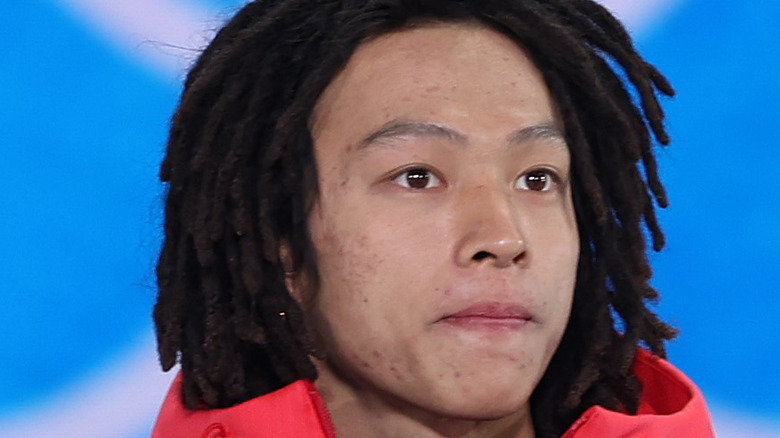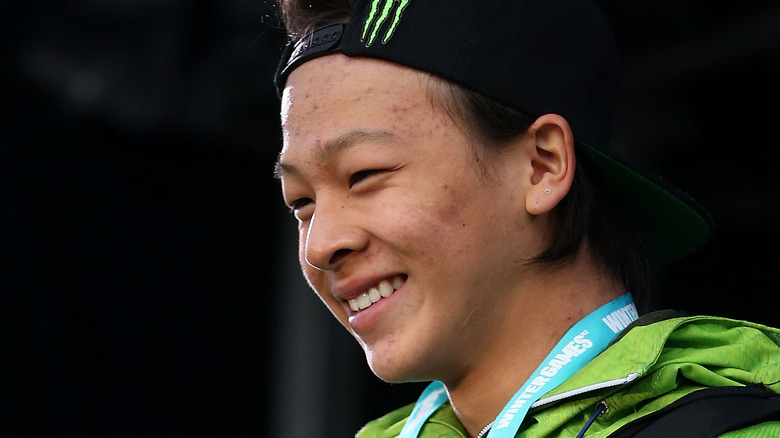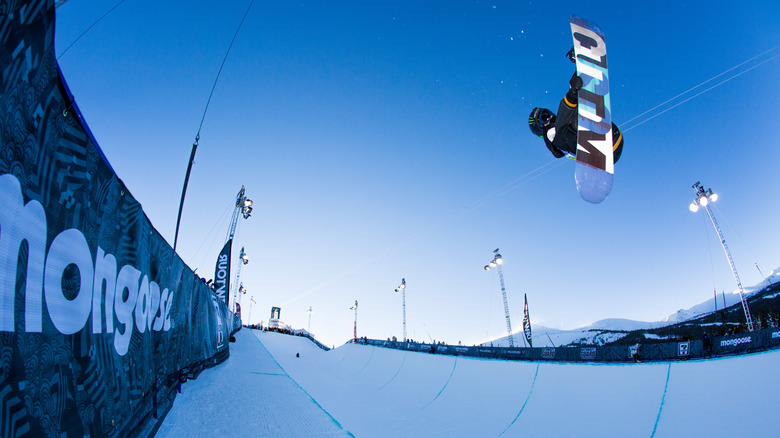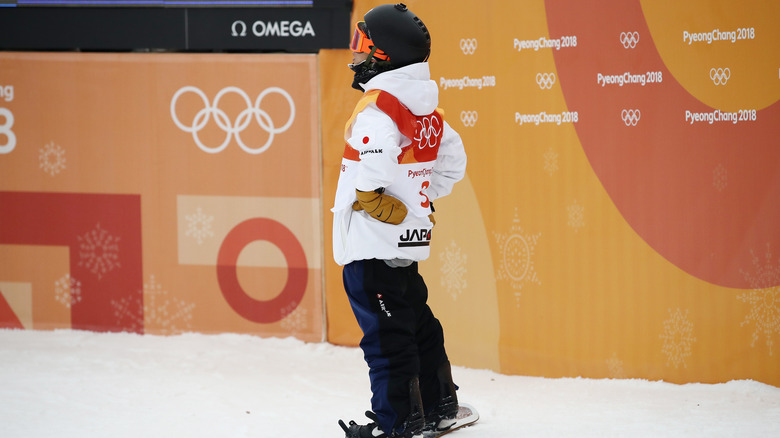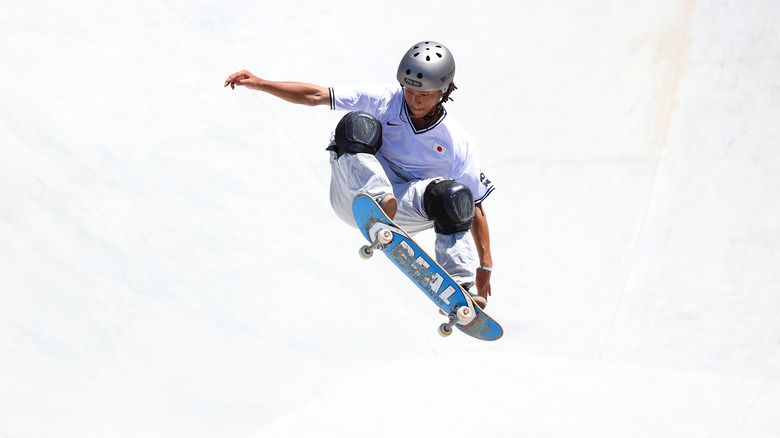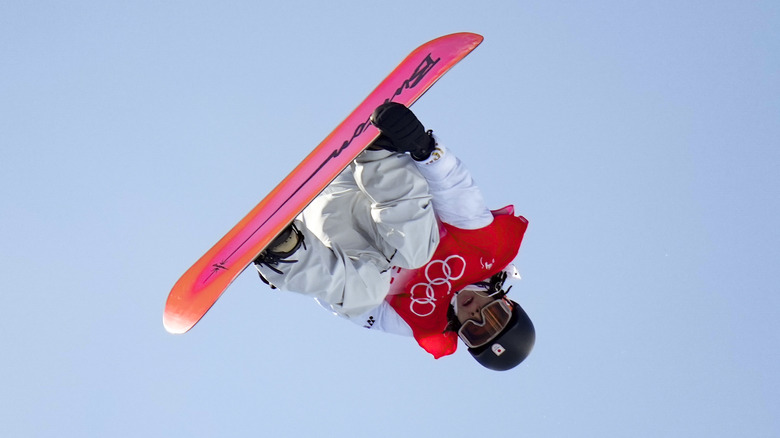The Untold Truth Of Olympic Snowboarder Ayumu Hirano
Two major storylines came out of the men's snowboard halfpipe competition at the 2022 Beijing Olympic Winter Games. The first was that it marked the end of legendary American snowboarder Shaun White's career; the final runs of his career landed him in fourth place just off the podium.
The other story was the revelation that the halfpipe torch was being passed from White to a new generation of boundary-pushing athletes, headlined by Japan's 23-year-old superstar Ayumu Hirano. Despite his age, Beijing marked his third Olympics following second-place finishes in both Sochi in 2014 and PyeongChang in 2018 where he was bested only by Shaun White (via Olympics).
According to the Dew Tour, Hirano is considered to be a snowboarding prodigy and has seen a meteoric rise through the ranks of the sport that culminated with an unprecedented trick he threw down on the Beijing halfpipe on the way to Olympic gold.
Ayumu Hirano's early life
Ayumo Hirano was born on November 28, 1998 in Murakami, Japan, per NBC Sports Boston. Murakami is located in Japan's Niigata prefecture which is known for snowy winters, a perfect place for a young snowboarder — whose name also means "walk the dream" to grow up.
According to the Olympics, Hirano got into both snowboarding and skateboarding at a very early age. His father owned a surf shop and built a skate park so that his kids could use to practice. Hirano's older brother, Eiju, also competed in snowboarding at an international level, as does his younger brother, Kaishu, who would be a fellow competitor in the halfpipe finals in Beijing.
It was on the slopes of the Yokone Ski Resort in Yamagata prefecture where Hirano first caught the attention of the snowboarding world. He was only in the fourth grade when he received a sponsorship from snowboard company Burton, one of the sport's biggest-name manufacturers.
Hirano takes the snowboarding scene by storm
Hirano made his competitive debut in the 2011 Nor-Am Cup, placing finishing deep in the field. One of the first major career milestones for the high-flying snowboarding prodigy came at Winter X Games 2013 in Aspen, Colorado. In the superpipe competition, Hirano became the youngest athlete to ever win a medal, claiming a silver medal at just 14 years old. Also in 2013, Hirano would finish first in the 2013 World Cup.
In 2014 Hirano would make his Olympic debut at the Winter Games in Sochi. Going into the competition, the snowboarding world was looking for the next rider who could top the all-conquering Shaun White, who had claimed gold in the halfpipe event in the two previous Olympics; 2006 in Torino, Italy and 2010 in Vancouver, British Columbia.
In Sochi, Hirano would manage to place himself on the podium with a second-place finish to White's fourth, in the process becoming the youngest medalist in the event's history according to the Olympics.
Hirano comes up just short in the 2018 Olympics
Hirano would continue his upward trajectory. He would win his first X Games gold medal in 2016 at the superpipe event in Oslo, Norway. However, the next year Hirano would be faced with a setback. According to the Olympics Hirano suffered a nasty fall in Vail, Colorado that left him with a series of injuries including damage to his liver and the ligaments in his knee. He faced a three-month recovery but was back to his regular form by 2018 when he won another X Games gold medal in superpipe.
2018 saw the arrival of the 2018 PyeongChang Winter Olympics and another chance for Hirano to claim Olympic gold. Hirano was leading the event during the final round of runs until Shaun White dropped into the halfpipe and snatched the gold medal away from him. It was another silver medal to his name, but a major disappointment for Hirano.
"... [T]he result is the result," he told ESPN at the time. "And whatever I do, whatever I say, the result cannot be changed.
Ayumu Hirano, the two-sport athlete
Snowboarding has been an Olympic fixture since its debut at the 1998 Winter Games in Nagano, Japan. Skateboarding, however, wouldn't make it into the Olympics until the 2020 Summer Olympics — which were delayed until 2021 — in Tokyo.
Hirano had taken up skateboarding around the same time that he had started snowboarding. With skateboarding not being his primary sport, qualifying for the Summer Olympics would take three years of focus. "That was also a time period where I was no longer doing what I was best at," he said to USA Today. "While practicing, I realized the difficulty of what everyone else can do, the higher level. It was a reminder of the difficulty of being able to do what others couldn't do."
He would qualify for the Games, but Hirano would exit the skateboard park competition in the preliminary rounds after falls in each of his runs.
Hirano unleashes the triple cork on the Olympic competition
Following the delayed 2020 Olympics, Hirano quickly shifted focus back to his primary sport of snowboarding and the 2022 Beijing Winter Games. Again, he would enter the competition as one of the favorites.
At a stop on the 2021 Dew Tour at Copper Mountain, Hirano landed the first triple cork in competition, per the Olympics. A triple cork is a dizzying series of three flips and the trick would be the not-so-secret weapon Hirano had up his sleeve heading into Beijing.
Hirano landed the trick on of his first run, but an error down the halfpipe put the pressure on him for his later runs. According to NBC Sports Boston, he landed the trick again in his second run, one which television analyst Todd Richards called "the best run that's ever been done in the halfpipe." Shockingly, the judges disagreed, with the run only positioning Hirano in second place behind Australia's Scotty James.
Hirano's final run, however, was perfection
Following the delayed 2020 Olympics, Hirano quickly shifted focus back to his primary sport of snowboarding and the 2022 Beijing Winter Games. Again, he would enter the competition as one of the favorites.
At a stop on the 2021 Dew Tour at Copper Mountain, Hirano landed the first triple cork in competition, per the Olympics. A triple cork is a dizzying series of three flips and the trick would be the not-so-secret weapon Hirano had up his sleeve heading into Beijing.
Hirano would land the trick on of his first run, but an error down the halfpipe put the pressure on him for his later runs. According to NBC Sports Boston, he landed the trick again in his second run, one which television analyst Todd Richards called "the best run that's ever been done in the halfpipe." Shockingly, the judges disagreed, with the run only positioning Hirano in second-place behind Australia's Scotty James.
Hirano's final run, however, was perfection and earned him a score of 96.00 and the gold medal. He was joined on the podium by James (silver), and Switzerland's Jan Scherrer (bronze), according to the Olympics.
